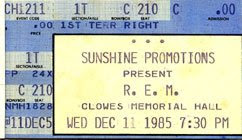
Lou Reed - Doin The Things That We Want To
Fine Young Cannibals – I’m Not The Man I Used To Be
Hothouse Flowers - I Can See Clearly Now
Ella Fitzgerald - I Got The Spring Fever Blues
Tony Allen - Where The Streets Have No Name
Moby - Sweet Apocalypse
Dengue Fever - Seeing Hands
Black Angels - Mission District
Foals - Big Big Love (Fig. 2)
The Duke Spirit - Dog Roses
Wye Oak - A Lawn To Mow
Fire on Fire – Hangman
Antsy Pants - Tree Hugger
Billy Bragg - The World Turned Upside Down
Casey Neill - Mayday
The Layabouts - Ballad of Donna Lewis
Hakim Bey – Chaos (edited)
Crow Women - Song of Beltane
Jaiya - Beltane Night
Loreena McKennitt - Huron Beltane Fire Dance
Ashley Ironwood – Forever Wild
Indigo Girls - Southland In The Springtime
Doug Burr - Slow Southern Home









